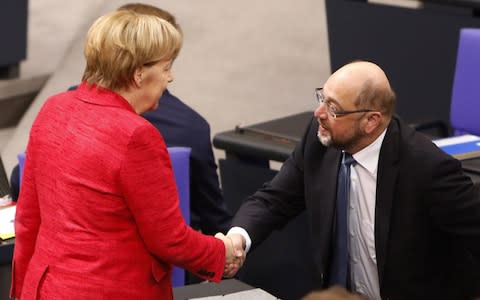Schulz comes under pressure to offer Merkel a lifeline after coalition talks collapse

Talks were underway in Berlin on Thursday night to end the political crisis in Germany following the collapse of Angela Merkel’s coalition talks.
Martin Schulz, leader of the rival Social Democratic Party (SPD), was widely expected to drop his insistence on new elections and offer to throw Mrs Merkel a lifeline — for now.
But it remained unclear whether his party was prepared to open negotiations on a new coalition with Mrs Merkel’s Christian Democrats (CDU), or would offer to support a minority government from the outside.
Mr Schulz was holding talks with his party to agree a new position after several prominent MPs came out in open rebellion against his refusal to consider any sort of arrangement with Mrs Merkel.
He is also believed to have come under intense pressure from President Frank-Walter Steinmeier to change his mind at a one-on-one meeting on Thursday afternoon.
Germany is facing months of uncertainty following the collapse of Mrs Merkel’s coalition talks with the pro-business Free Democrats (FDP) and the Green Party.

The SPD is the only party with enough seats in parliament to break the impasse, but Mr Schulz vowed to take it into opposition after its worst ever election result in September.
He refused to reconsider following the breakdown in coalition talks, insisting the party has nothing to fear from new elections, but has faced a barrage of criticism from his own MPs.
The SPD is believed to be divided over whether to be part of a new coalition, or only offer to prop up a minority government.
Several leading figures in the party have voiced support for the idea of a minority government, which would force Mrs Merkel to find a majority for each issue in parliament, and according to unconfirmed reports Mr Schulz is leaning towards this option.

But senior SPD voices spoke out against the proposal on Thursday, warning it could lead to instability.
“I am very skeptical about a minority government. Europe needs stable government in Germany,” said Olaf Scholz, the mayor of Hamburg, who is seen as a possible successor to the beleaguered Mr Schulz.
“In principle, minority governments are fragile entities,” Stephan Weil, the regional prime minister of Lower Saxony state said.
“If anything, we’ll have to think about a new coalition,” said Karl Lauterbach, a senior MP.
The SPD was in coalition with the Christian Democrats before the election, and Mrs Merkel’s party has made clear it would welcome a renewal of the deal.
“The major parties, which have dominated the history of the federal republic, have a special responsibility to ensure the country has good government after this election result,” said Volker Kauder, leader of the CDU group in parliament.

 Yahoo News
Yahoo News 
